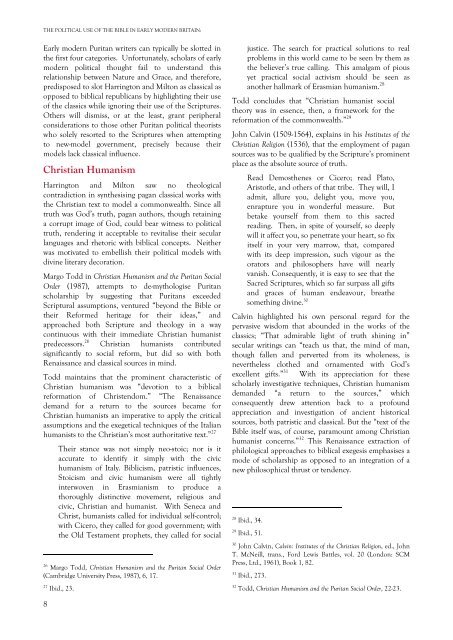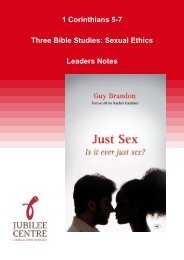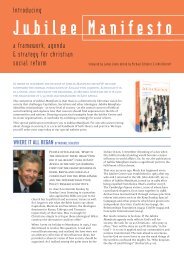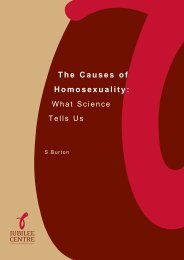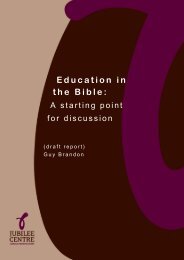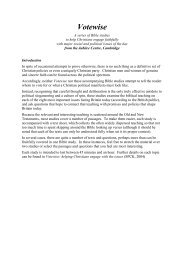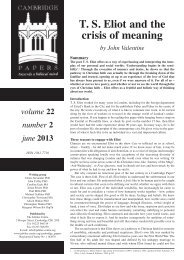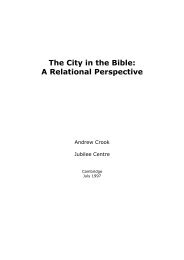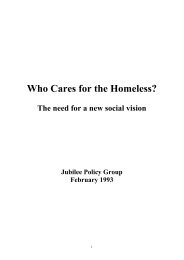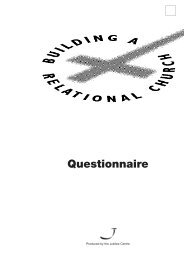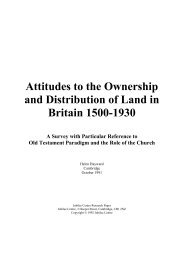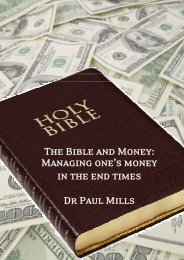Report Template - Jubilee Centre
Report Template - Jubilee Centre
Report Template - Jubilee Centre
Create successful ePaper yourself
Turn your PDF publications into a flip-book with our unique Google optimized e-Paper software.
THE POLITICAL USE OF THE BIBLE IN EARLY MODERN BRITAIN:<br />
Early modern Puritan writers can typically be slotted in<br />
the first four categories. Unfortunately, scholars of early<br />
modern political thought fail to understand this<br />
relationship between Nature and Grace, and therefore,<br />
predisposed to slot Harrington and Milton as classical as<br />
opposed to biblical republicans by highlighting their use<br />
of the classics while ignoring their use of the Scriptures.<br />
Others will dismiss, or at the least, grant peripheral<br />
considerations to those other Puritan political theorists<br />
who solely resorted to the Scriptures when attempting<br />
to new-model government, precisely because their<br />
models lack classical influence.<br />
Christian Humanism<br />
Harrington and Milton saw no theological<br />
contradiction in synthesising pagan classical works with<br />
the Christian text to model a commonwealth. Since all<br />
truth was God’s truth, pagan authors, though retaining<br />
a corrupt image of God, could bear witness to political<br />
truth, rendering it acceptable to revitalise their secular<br />
languages and rhetoric with biblical concepts. Neither<br />
was motivated to embellish their political models with<br />
divine literary decoration.<br />
Margo Todd in Christian Humanism and the Puritan Social<br />
Order (1987), attempts to de-mythologise Puritan<br />
scholarship by suggesting that Puritans exceeded<br />
Scriptural assumptions, ventured “beyond the Bible or<br />
their Reformed heritage for their ideas,” and<br />
approached both Scripture and theology in a way<br />
continuous with their immediate Christian humanist<br />
predecessors. 26 Christian humanists contributed<br />
significantly to social reform, but did so with both<br />
Renaissance and classical sources in mind.<br />
Todd maintains that the prominent characteristic of<br />
Christian humanism was “devotion to a biblical<br />
reformation of Christendom.” “The Renaissance<br />
demand for a return to the sources became for<br />
Christian humanists an imperative to apply the critical<br />
assumptions and the exegetical techniques of the Italian<br />
humanists to the Christian’s most authoritative text.” 27<br />
Their stance was not simply neo-stoic; nor is it<br />
accurate to identify it simply with the civic<br />
humanism of Italy. Biblicism, patristic influences,<br />
Stoicism and civic humanism were all tightly<br />
interwoven in Erasmianism to produce a<br />
thoroughly distinctive movement, religious and<br />
civic, Christian and humanist. With Seneca and<br />
Christ, humanists called for individual self-control;<br />
with Cicero, they called for good government; with<br />
the Old Testament prophets, they called for social<br />
26<br />
Margo Todd, Christian Humanism and the Puritan Social Order<br />
(Cambridge University Press, 1987), 6, 17.<br />
27<br />
Ibid., 23.<br />
justice. The search for practical solutions to real<br />
problems in this world came to be seen by them as<br />
the believer’s true calling. This amalgam of pious<br />
yet practical social activism should be seen as<br />
another hallmark of Erasmian humanism. 28<br />
Todd concludes that “Christian humanist social<br />
theory was in essence, then, a framework for the<br />
reformation of the commonwealth.” 29<br />
John Calvin (1509-1564), explains in his Institutes of the<br />
Christian Religion (1536), that the employment of pagan<br />
sources was to be qualified by the Scripture’s prominent<br />
place as the absolute source of truth.<br />
Read Demosthenes or Cicero; read Plato,<br />
Aristotle, and others of that tribe. They will, I<br />
admit, allure you, delight you, move you,<br />
enrapture you in wonderful measure. But<br />
betake yourself from them to this sacred<br />
reading. Then, in spite of yourself, so deeply<br />
will it affect you, so penetrate your heart, so fix<br />
itself in your very marrow, that, compared<br />
with its deep impression, such vigour as the<br />
orators and philosophers have will nearly<br />
vanish. Consequently, it is easy to see that the<br />
Sacred Scriptures, which so far surpass all gifts<br />
and graces of human endeavour, breathe<br />
something divine. 30<br />
Calvin highlighted his own personal regard for the<br />
pervasive wisdom that abounded in the works of the<br />
classics; “That admirable light of truth shining in”<br />
secular writings can “teach us that, the mind of man,<br />
though fallen and perverted from its wholeness, is<br />
nevertheless clothed and ornamented with God’s<br />
excellent gifts.” 31 With its appreciation for these<br />
scholarly investigative techniques, Christian humanism<br />
demanded “a return to the sources,” which<br />
consequently drew attention back to a profound<br />
appreciation and investigation of ancient historical<br />
sources, both patristic and classical. But the “text of the<br />
Bible itself was, of course, paramount among Christian<br />
humanist concerns.” 32 This Renaissance extraction of<br />
philological approaches to biblical exegesis emphasises a<br />
mode of scholarship as opposed to an integration of a<br />
new philosophical thrust or tendency.<br />
28<br />
Ibid., 34.<br />
29<br />
Ibid., 51.<br />
30<br />
John Calvin, Calvin: Institutes of the Christian Religion, ed., John<br />
T. McNeill, trans., Ford Lewis Battles, vol. 20 (London: SCM<br />
Press, Ltd., 1961), Book 1, 82.<br />
31<br />
Ibid., 273.<br />
32<br />
Todd, Christian Humanism and the Puritan Social Order, 22-23.<br />
8


